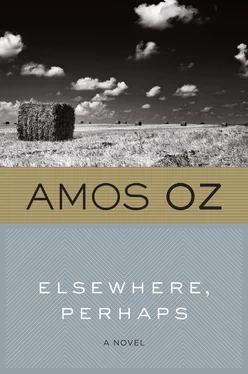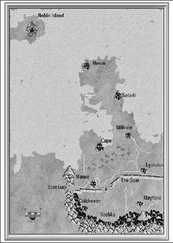Zechariah and Oren had long hours of leisure during the summer. They took over the secret space between the pillars that supported the Bergers' house, and there Siegfried constructed an intricate network of lines running over hills and down valleys, through tunnels and across bridges. There were junctions and stations and gradients and branches laid out with rich imagination.
Oren was not tall, but his body was broad and solid, his face broad and compact. His hair was close-cropped and rough. Siegfried often said:
"What a masculine appearance. What an air of manhood. Enough to overpower the most fragile and delicate women, with pure, transparent skin and slender bodies. They'll fall for you. You're tough."
Oren noticed a dirty smile fleeting like a shadow beneath his uncle's bushy eyebrows, accompanied by the closing of one eye and the opening wide of the other, as if in absent-mindedness, or the opposite.
The space between the pillars of the house was cool and dim. It was a secret hiding place. The garden plants hid it from the path that led to the steps up to the veranda. True, neither Siegfried nor Oren could stand up straight here. But they had no intention of standing up. They bent over their flashing toy, holding handles and levers and electric switches, their heads extended and their bodies curled. They hardly spoke. Even Siegfried suppressed his usual cheerful chatter. Sometimes he smoked as he played. On one occasion Oren dared to ask him casually for a cigarette. Siegfried grinned happily and said:
"Certainly not. I can't let you smoke. You're too young."
Oren agreed earnestly:
"Yes. Because it's wrong."
Zechariah curled his lower lip, displaying its pink inside.
"Yes, wrong. Improper. Not allowed."
Oren said:
"Against the principles."
Siegfried said:
"Corrupting."
Oren said:
"And very nasty."
Siegfried said:
"It harms the innocence of youth. And nothing is more precious than youthful innocence.
Oren said:
"Nothing in the world."
Siegfried let out a low chuckle. Oren did not echo it. They smoked in silence.
Let us watch them, the man and the boy, racing the engines toward one another until they collide with a dry bang. Yellow sparks flash from the line. If they continue like this they will soon end up by destroying the fascinating toy. If it had been given to us, we would have hidden it away in a cupboard and played with it when no one was looking, in an entirely different way. We would not have been carried away by the thrill of destruction. We love system and harmony.
First of all, the control panel, with its different-colored switches, red and green and black. From here you can govern the whole complicated layout with two fingers. You can operate the junctions and raise and lower automatic crossing gates. You can make a train go faster, or stop it in mid-course. You can even work a shunting engine in one of the tiny stations and detach a wagon from one train and connect it to another. That is not all. By means of an intricate clock mechanism you can set the whole system, with its various levels and junctions, to run automatically. All its operations are co-ordinated according to an accurate timetable. But by doing this you take all the fun out of the game.
The shape of the engines is strictly rectangular; they convey a striking impression of restrained power. Through the windshield you can see the tiny figure of the driver, with his peaked cap, and the assistant driver with a bushy mustache. Little passengers peep out of the red carriages with their German inscriptions, respectable gentlemen with hats and suits, businessmen in gray raincoats, ladies in traveling clothes, even the bags and suitcases have not been forgotten. They are neatly stacked on the shelves above the seats.
Is there any thrill in the world to compare with the thrill of complete mastery, Fingers running lightly over the control panel and deciding numerous fates? But, alas, we can also see how even this noble pleasure can degenerate in the hands of unscrupulous adventurers in insatiable quest of the unusual, the fascinating, and the unnatural.
Siegfried and Oren run the trains head-on at one another and enjoy the crash and the sparks. At times Siegfried rests his arm on Oren's shoulder and says affectionately:
"My orphan. You're strong and tough. Don't give in to them."
And Oren, with a strange gleam in his eye, replies:
"No, I won't give. I'll take. It's a pity you're going away. You and I could. Yesterday I exploded a hand grenade in the wood. I threw it into a fire. It smashed the fire."
Zechariah:
"Put out this flame. No, not by blowing. The way I do it. With your finger. That's the sign."
"I want you to tell me why you came. You tell lies. You're ugly."
"No, my boy. You can count on me. I shan't leave before I'm finished. I shan't abandon my agents."
"I can wire up the veranda railings. Electrify them."
"No, there's no need to do that. You mustn't. Someone might get hurt."
"Suppose you go away and I'm left alone."
"My orphan. You can manage on your own. You're tough. Gentle women love tough orphans."
A few minutes later, as Oren laid a gray freight car across the track to derail a fast-moving train:
"Hey, Uncle, what's the matter with you? Are you a clown? Are you ill?"
Siegfried, with supreme seriousness:
"Hush. I am ill. I'm seriously ill. Cancer. I'll die again soon. Actually, I came here to die in the Holy Land. Our poor brother Zechariah, may his memory be for a blessing, may his soul be bound up in the bundle of life, was a strange man but an interesting and original one. Peace be upon his ashes, saith Herbert Segal."
Oren, his eyes screwed up and his jaw protruding:
"When? How long?"
"Oh, my silly little orphan, I was only kidding. I'm not a sick man. I'm still alive. I shan't die here. I shall die in the forests. In enemy territory. I came here to honor thy father and thy mother."
"You're like my father, only much more."
"You, too, son. Both of us. I'm not my brother's brother, and you're not your brother's brother. Cain and Abel. You're a bad apple. You'll fall off the good tree."
"No, I'll infect them. All of them."
"Firm and clean on the outside, sweeter than a good one inside. Juicier. Sweet decay, the essence of rottenness."
"You're mad, Siegfried. That's what my mother says."
"Your mother has an excellent eye for character."
Sometimes the waves throw up a rotting plank on the beach. To and fro the water tosses the blackened object, alternately dashing it on the sand and dragging it back with a melancholy rhythmic ebb and flow. You would suppose the plank would go on being wave-tossed for ever. To and fro, to and fro. But you can't trust water. Suddenly it abandons its baby, leaving it high and dry. From now on it belongs to the desolate sands, to the yellow vengeance of the scorching sun, a solitary black spot.
Afternoon again. Once again the lawn offers its gentle slope. The leafy trees once more filter the slanting rays, which pattern the green with nervous spots of light.
Einav and Tomer, clad in white shorts, are playing tennis. Einav is fair, with a broad face and gently molded figure. Tomer is dark, with thick hairy arms, and his movements are economical. The ball arcs elegantly from one racket to the other. The players are so skillful that their motions are hardly perceptible. A slight twist of the hips, a short sharp wave of the arm, a glance to follow the ball's flight.
Two or three children watch the couple play, exchanging covert giggles and whispers. Far off to the west a busy motor chugs. The distance softens the sound. A powerful smell of coffee fills the air. Herzl Goldring is working in his own garden. His plot is trimmed in amazingly rectangular forms. His wife Nina looks on from the veranda, wearing her reading glasses. She is busy writing a letter, or an article for the kibbutz newssheet. Reuven Harish comes out for his evening stroll. He will be back in twenty minutes, as usual.
Читать дальше












